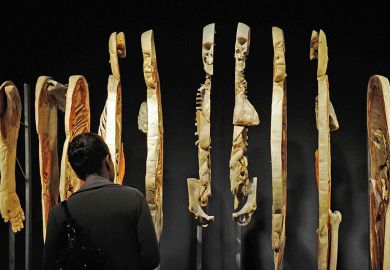Two Nobel prizewinners have backed an open letter signed by more than 600 academics, researchers and support staff calling on the Medical Research Council (MRC) to revisit funding changes that could lead to the closure of several highly successful research units.
Former Royal Society president Venki Ramakrishnan, who won the Nobel Prize in Chemistry in 2009, and recent physics laureate Geoffrey Hinton, known for his pioneering work on artificial intelligence, have been joined by Martin Rees, the Astronomer Royal, in questioning the MRC’s shift towards a funding model that removes direct sustained investment in existing research units.
Replacing the previous system that awarded units up to £10 million a year, the MRC’s Centre of Excellence (CoRE) now caps unit funding at £3 million annually.
As Times Higher Education reported in March 2023, senior scientists believed this model would force several world-renowned units to restructure their operations when their current funding expired, even if they won funding under the new system.
According to the University and College Union (UCU), which organised the open letter highlighting the changes, all three units that have so far applied for the new CoRE funding have been unsuccessful. Among them is The Social and Public Health Sciences Unit, based at the University of Glasgow, which will close later this year, with 80 staff currently at risk of redundancy, according to the UCU.
Highlighting the changes, the open letter claims that the full impact of the new funding model has been underestimated because MRC units are unique scientific assets with international prominence and losing them will detrimentally affect the entire UK medical research sector.
It alleges that the process behind the decision to change the funding model was not transparent, no stakeholders were consulted before the decision was taken and there was no governmental or parliamentary scrutiny of the decision, which will place thousands of highly skilled scientists and staff at risk of redundancy.
“It would be a tragedy for medical research in the UK if the MRC units were lost simply because of a sense of inevitability, or a reluctance to revisit previous decisions”, states the letter which calls on the government to pause the funding changes until the signatories’ concerns have been addressed.
Other signatories of the letter include Harvard University professor Steven Pinker and former president of the Royal Statistical Society, David Spiegelhalter, alongside nearly 70 other national academy fellows, 110 professors and more than 300 other academics, researchers, and support staff from the UK and abroad.
UCU general secretary Jo Grady said the decision to change the funding model had been “made behind closed doors by a previous MRC leadership.”
“As evidenced by the hundreds of signatories to our letter, the academic community vehemently opposes the changes and [science secretary] Lord Vallance and [MRC executive chair] Patrick Chinnery now need to listen to those impacted to ensure that there is a proper debate about the impact of the changes and consider an alternative that preserves these national assets.”
In a House of Lords debate in October in which Imperial College London professor Robert Winston raised the impact of the MRC changes, however, Vallance stated that the “new MRC centres of research excellence model will improve how we bring together the best science, skills and leadership to focus on key challenges in medical research”.
In a THE editorial in December, Chinnery explained that those units which made the “transition [to the CoRE model] will enjoy the advantages of a reduced bureaucratic burden on research teams and long-term financial security” given funding periods will now last up to 14 years.
Register to continue
Why register?
- Registration is free and only takes a moment
- Once registered, you can read 3 articles a month
- Sign up for our newsletter
Subscribe
Or subscribe for unlimited access to:
- Unlimited access to news, views, insights & reviews
- Digital editions
- Digital access to THE’s university and college rankings analysis
Already registered or a current subscriber?








